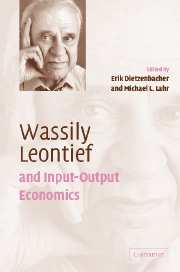Book contents
- Frontmatter
- Contents
- List of contributors
- List of figures
- List of tables
- Preface
- Part I Reflections on input-output economics
- Part II Perspectives of input-output economics
- 10 A neoclassical analysis of total factor productivity using input-output prices
- 11 What has happened to the Leontief Paradox?
- 12 The decline in labor compensation's share of GDP: a structural decomposition analysis for the United States, 1982 to 1997
- 13 An oligopoly model in a Leontief framework
- 14 Economies of plant scale and structural change
- 15 Technological change and accumulated capital: a dynamic decomposition of Japan's growth
- 16 Japan's economic growth and policy-making in the context of input-output models
- 17 Contributions of input-output analysis to the understanding of technological change: the information sector in the United States
- 18 How much can investment change trade patterns? An application of dynamic input-output models linked by international trade to an Italian policy question
- 19 Social cost in the Leontief environmental model: rules and limits to policy
- Subject index
- Author index
11 - What has happened to the Leontief Paradox?
Published online by Cambridge University Press: 22 September 2009
- Frontmatter
- Contents
- List of contributors
- List of figures
- List of tables
- Preface
- Part I Reflections on input-output economics
- Part II Perspectives of input-output economics
- 10 A neoclassical analysis of total factor productivity using input-output prices
- 11 What has happened to the Leontief Paradox?
- 12 The decline in labor compensation's share of GDP: a structural decomposition analysis for the United States, 1982 to 1997
- 13 An oligopoly model in a Leontief framework
- 14 Economies of plant scale and structural change
- 15 Technological change and accumulated capital: a dynamic decomposition of Japan's growth
- 16 Japan's economic growth and policy-making in the context of input-output models
- 17 Contributions of input-output analysis to the understanding of technological change: the information sector in the United States
- 18 How much can investment change trade patterns? An application of dynamic input-output models linked by international trade to an Italian policy question
- 19 Social cost in the Leontief environmental model: rules and limits to policy
- Subject index
- Author index
Summary
Introduction
Standard trade theory predicts that a country will export products that intensively use endowments in which a country is favored relative to the other countries and will import products that are intensive in endowments scarce in that country. It was generally believed, for example, that the United States exported capital-intensive goods and imported laborintensive ones, but empirical work showed that US exports tended to be human-capital intensive and imports capital intensive – the so-called “Leontief Paradox.”
In this paper, I investigate the Leontief Paradox in the United States for the period from 1947 to 1996. Does the Leontief Paradox continue to hold? Does it hold when we consider only equipment and machinery, and, in particular, only office and computing equipment?
A related issue regards the R&D intensity of US trade. During the 1960s and 1970s the major export strength of the United States lay in industries where research was heavily subsidized by the US government (particularly the Department of Defense), including aircraft, armaments, mainframe computers, and medical equipment (Dollar and Wolff, 1993). Is it still the case?
This paper presents statistics on the capital content of both US exports and imports from 1947 to 1996. It also contains a discussion of the relative labor costs and productivity performance of US exports and imports. Both the direct and indirect content of trade are then computed using input-output data.
- Type
- Chapter
- Information
- Wassily Leontief and Input-Output Economics , pp. 166 - 187Publisher: Cambridge University PressPrint publication year: 2004
- 2
- Cited by



